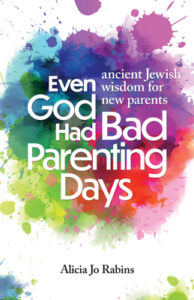Even God Had Bad Parenting Days by Alicia Jo Rabins (Book Excerpt)
 It’s easy to wax philosophical about impermanence. It’s much harder to access that objectivity and wisdom while a small human is screaming at top volume.
It’s easy to wax philosophical about impermanence. It’s much harder to access that objectivity and wisdom while a small human is screaming at top volume.
Things are pretty confusing in my house right now. One minute Sylvia’s telling me I’m her cutie pie and complimenting my earrings, and the next she’s in full-on tantrum mode because I made her put on socks.
Her two-year-old emotions are mercurial, overwhelming, everything in the moment—and then suddenly they’re gone. To my logical adult brain, this is frustrating. But when I’m able to get some distance, I recognize that she’s also reflecting a spiritual truth: everything changes. This is the truth of impermanence, and I understand it in a new way as a mom.
Like some kind of superhero, Sylvia constantly transforms into new versions of herself. In June, she passionately declares frozen mango the most delicious fruit in the world; by July, she hates it. In the fall, she struggles to climb the play structure; by winter, she’s fearlessly clambering to the top.
Even the changes change.
First there were the newborn days, which felt excruciatingly slow. During that time, if I went for a walk during what felt like hour thirty-six of the day, complete strangers on the street—who in normal times would have ignored me—would see my baby, smile ruefully, and say, “It goes so fast.”
I always wanted to thwack them; nothing goes fast on four hours of sleep.
Two short years later, I couldn’t believe that little tiny girl was gone forever, replaced by a walking, talking, joke-cracking toddler.
Impermanence isn’t just for little ones; to be human is to exist in a state of flux. The difference is, we adults—and by “we,” I mean “I”— resist change. I cling to what came before, even when it causes me suffering.
But children are masters of change. They steadily grow into new versions of themselves, letting go of who they were without a second thought. Watching them grow is a lesson in impermanence. My toddler teaches me that I, too, can change my mind. I, too, am a work in progress.
Back to real life, though. It’s easy to wax philosophical about impermanence. It’s much harder to actually access this level of objectivity and wisdom while a small human is screaming at top volume because you put pasta sauce on her noodles instead of next to them.
And this is why I so appreciate the fact that in the Torah, the main characters—including God—all have moments of acting like overwhelmed parents. Despite the best intentions of remaining patient and compassionate, they, like us, lose their cool.
For example, the Exodus from Egypt. We love to celebrate this story of miraculous liberation. Less often do we mention the fact that the recently liberated Israelites are extremely whiny. (Sound familiar?)
They’re tired of wandering in the desert, and they sit around complaining about how they miss the delicious meat they used to eat in Egypt. Moses, like a stressed-out parent, finally hits a wall. He can’t take any more whining and complains to God that he’d rather die than lead these people.
And how does God handle this? By making quail rain down from the sky, then sending a plague to kill the Israelites who choose to eat it.
This is not a pretty story. In fact, it’s exactly this kind of thing that makes people think of God as a vengeful guy in the sky with a white beard.
But reading this as a mother, I think: who am I to judge? I get it. I’ve had my crappy parenting days too.
In the Torah, stories take place on a mythic scale. A bad day means quail raining from the sky and a deadly plague. In real life, we express our parental frustration in (hopefully) more mundane ways.
Still, I have a lot of compassion for God here, getting swept up in a difficult moment and forgetting all about patience and deep breaths. It’s easy to lose it when it seems like a hard day, or a spectacular tantrum, or a difficult stage is going to last forever.
My favorite thing about this story, though, is what happens next: nothing. The Israelites keep walking, Moses stays on as their leader, and God continues to accompany them through the wilderness. In the end, this terrible episode is just a blip in their relationship.
Impermanence is in equal parts terrible and liberating. The things I love won’t last forever—but the things that drive me crazy, break my heart, or just plain hurt won’t last forever either. This is true in parenting, and in life.
As Sarah Napthali writes in her beautiful book Buddhism for Mothers of Young Children, “Impermanence, the fact that all things change, can be a mother’s best friend.”
Even our worst parenting moments don’t last forever. No matter how rough it gets, we can always apologize. We always get another chance to wake up with our little ones and start over . . .
Until one day they’re all grown up and gone, and we’re the person on the street—smiling that annoying sweet smile, saying to a haggard stranger with a newborn, “Enjoy these days. It goes so fast.”

Photo by Lucinda Roanoke
Excerpted with permission from Even God Had Bad Parenting Days © Alicia Jo Rabins 2022. Published by Behrman House www.behrmanhouse.com and available for order.
Alicia Jo Rabins is a writer, musician, performer and Torah teacher. Her work includes Girls in Trouble, an indie-folk song cycle about women in Torah with accompanying curriculum; the independent feature film, A Kaddish for Bernie Madoff; and two award-winning poetry collections, Divinity School and Fruit Geode.















